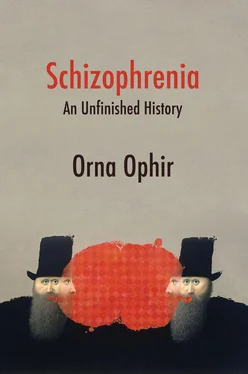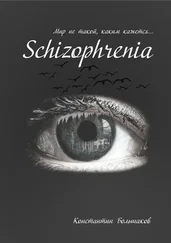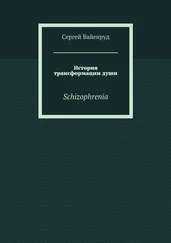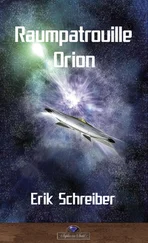1 ...7 8 9 11 12 13 ...20 Instead of favoring one paradigm over the other, or slipping into relativism pure and simple, those who deal with mental illness must accept the paradox – even the aporia – of having two seemingly exclusive accounts of the disorder operating concurrently. Being “of two minds,” 40they can then see a rabbit or a duck, in the full awareness that both are a case of “now you see it, now you don’t,” that present us with an incomplete sketch of what is, in “essence,” a much more complex and intractable phenomenon.
1 1. Louise Wilson, This Stranger, My Son (New York: G.P. Putnam, 1968), 10.
2 2. Thomas S. Kuhn, The Structure of Scientific Revolutions, 4th edn, with an Introduction by Ian Hacking (Chicago, IL: University of Chicago Press, 2012), 111.
3 3. Orna Ophir, Psychosis, Psychoanalysis and Psychiatry in Postwar USA: On the Borderland of Madness (New York: Routledge, 2015).
4 4. Thomas Szasz, Schizophrenia: The Sacred Symbol of Psychiatry (New York: Basic Books, 1976).
5 5. Guy M. Goodwin and John R. Geddes, “What is the heartland of psychiatry?,” British Journal of Psychiatry 191, 3 (2007): 189–91.
6 6. Paul Eugen Bleuler, “Die Prognose der Dementia praecox (Schizophreniegruppe),” Allgemeine Zeitschrift für Psychiatrie und psychischgerichtliche Medizin 65 (1908): 436–64. See also Paul Eugen Bleuler, Dementia Praecox or the Group of Schizophrenias, trans. J. Zinkin (New York: International Universities Press, 1950 [1911]).
7 7. Johann Christian Reil, “Über den Begriff der Medicin und ihre Verzweigungen, besonders in Beziehung auf die Berichtigung der Topik der Psychiaterie” (“On the Term of Medicine and its Ramifications, Particularly with Regard to the Revision of the Topic in Psychiatry”), in J. C. Hoffbauer (ed.), Beyträge zur Beförderung einer Kurmethode auf psychischem Wege (“Contributions to the Advancement of a Treatment Method by Psychic Ways”) (Halle: Curt’sche Buchhandlung, 1808), 161–279.
8 8. Plato, Phaedrus, XXI, 264e–266b, trans. R. Waterfield (Oxford: Oxford University Press, 2002), 52–6.
9 9. Seeking an answer to the question of whether it is the lover who should be favored or the non-lover, Socrates divides madness into sinister madness – caused by human ailments – on the one hand, and that which is divine or sent by the gods, on the other. Plato, Phaedrus, 244a, 25.
10 10. Ibid., 265b, 54–5.
11 11. German E. Berrios, “Classifications in psychiatry: A conceptual history,” Australian and New Zealand Journal of Psychiatry 33, 2 (1999): 145–6. See also Kenneth S. Kendler, “An historical framework for psychiatric nosology,” Psychological Medicine 39, 12 (2009): 1935–41.
12 12. See Ian Hacking, “Lost in the forest,” London Review of Books, 35, no. 15 (2008) and The Social Construction of What (Cambridge, MA: Harvard University Press, 1999), 83.
13 13. Hacking, The Social Construction of What, 113.
14 14. Daniel Mason and Honor Hsin, “‘A more perfect arrangement of plants’: The botanical model in psychiatric nosology, 1676 to the present day,” History of Psychiatry 29, 2 (2018): 131–46.
15 15. Ian Hacking, Mad Travelers: Reflections on the Reality of Transient Mental Illness (Charlottesville, VA: University of Virginia Press, 1998), 55.
16 16. The equivalent to the International Classification of Diseases (ICD) issued by the World Health Organization (WHO).
17 17. Knud Faber, Nosography in Modern Internal Medicine (New York: Paul B. Hoeber, 1923), vii, cited in Charles Rosenberg, Our Present Complaint: American Medicine Then and Now (Baltimore, MD: Johns Hopkins University Press, 2007), 17.
18 18. Rosenberg, Our Present Complaint.
19 19. Amy June Sousa, “Diagnostic neutrality in psychiatric treatment in North India,” in Tanya M. Luhrmann and Jocelyn Marrow (eds.), Our Most Troubling Madness: Case Studies in Schizophrenia Across Cultures (Oakland, CA: University of California Press, 2016), 47.
20 20. Anonymous, “First person account,” Schizophrenia Bulletin, 7, 1 (1981): 196–7.
21 21. Rosenberg, Our Present Complaint, 33.
22 22. Andrew Krystal, Duke University, cited in Clare Wilson, “Losing the labels: Psychiatry’s scientific revolution,” New Scientist 222, 2968 (2014): 10–11.
23 23. Javier Escobar, “An insider’s view of the new diagnostic and statistical manual of North American psychiatry (DSM-5),” Colombia Medica 44, 2 (2013): 129–31.
24 24. See Ian Hacking, “Making up people,” in T. C. Heller, M. Sosna and D. E. Wellbery (eds.), Reconstructing Individualism (Stanford, CA: Stanford University Press, 1986), 161–71.
25 25. Hacking, “Making up people,” 169.
26 26. G. Der, S. Gupta and R. M. Murray, “Is schizophrenia disappearing?,” The Lancet 335, 8688 (1990): 513–16.
27 27. Raymond C. Lake, Schizophrenia Is a Misdiagnosis: Implications for the DSM-5 and the ICD-11 (New York: Springer, 2012).
28 28. Jim van Os, “‘Schizophrenia’ does not exist,” British Medical Journal 352 (2016): i375.
29 29. Simon McCarthy-Jones, “The concept of schizophrenia is coming to an end,” The Independent, 4 September 2017.
30 30. Robin Murray, “Mistakes I have made in my research career,” Schizophrenia Bulletin, 43, 2 (2017): 253–6.
31 31. Kuhn, The Structure of Scientific Revolutions.
32 32. Joao P. De Aquino and David A. Ross, “Using biology to reconstruct psychiatric nosology from the bottom up,” Biological Psychiatry 82, 10 (2017): 71–4.
33 33. Per Bergsholm, “Is schizophrenia disappearing? The rise and fall of the diagnosis of functional psychoses: an essay,” BMC Psychiatry 16, 387 (2016): 2–9.
34 34. NIMH’s Research Domain Criteria (RDoC); see https://www.nimh.nih.gov/research/research-funded-by-nimh/rdoc/about-rdoc.shtml, and Bruce N. Cuthbert, “The NIMH Research Domain Criteria (RDoC): New concepts for mental disorders,” Psychiatric Times 34, 5 (2017).
35 35. Richard Noll, American Madness: The Rise and Fall of Dementia Praecox (Cambridge, MA: Harvard University Press, 2011), 282.
36 36. Hierarchical Taxonomy of Psychopathology (HiTOP): See R. Kotov, R. F. Krueger, D. Watson, et al., “The Hierarchical Taxonomy of Psychopathology (HiTOP): A dimensional alternative to traditional nosologies.” Journal of Abnormal Psychology 126, 4 (2007): 454–77.
37 37. Nikolas Rose, Our Psychiatric Future (Cambridge: Polity Press, 2019), 92.
38 38. Hacking, Mad Travelers, 87.
39 39. Norman Sartorius, Helen Chiu, Kua Ee Heok, et al., “Name change for schizophrenia,” Schizophrenia Bulletin 40, 2 (2014): 255–8.
40 40. Tanya M. Luhrmann, Of Two Minds: The Growing Disorder in American Psychiatry (London: Picador, 2000).
Chapter 1 From the Bible to Bleuler
When reconstructing the history of schizophrenia as a diagnosis, a medical concept, and a condition that requires clinical treatment, it is important to keep the patient’s view in mind. 1As Roy Porter aptly instructed us, we ought to write the people’s history of suffering as we try to understand what “schizophrenia” was for the person who was ill, diagnosed, and treated. 2Here is one such narration, to begin with:
I was diagnosed with schizophrenia on February 21, 1995, I was 22 years old, and my reaction was initially shock … the word “mad” surfaced in my mind. It was not just the word; my mind actually did a complete reversion to my childhood, particularly 2 stories: Alice in Wonderland and Dr Jekyll and Mr Hyde … The images of the [Mad] hatter, Mr Hyde, and those other famous characters made by the media … reinforce the notion of madness as something to instill comic relief or as fascinatingly dangerous: How can something that destroys families, relationships, and friendships be considered “funny.” There is nothing laughable about losing one’s direction in life. There is no joke in one’s brain playing such vile tricks to take you to an anxiety point that may result in suicide. (Mark Ellerby, 2018) 3
Читать дальше












